Dead Joker Read online
Page 26
“There’s nothing but trouble with the authorities,” he mumbled, looking down at his feet.
“So they came, then?”
The man looked doubtful.
“No.”
“But there was a break-in? Was I right about that?”
“Only in the basement. Nothing worth getting worked up about. I chased him out the door myself. Who are you, anyway?”
The man turned slowly on his heel.
“Then I apologize for disturbing you. Enjoy the rest of the Easter weekend.”
He touched his hand to his forehead by way of farewell, and turned his back. Moments later he was gone. Karlsen locked the door with the double lock and security chain before returning to his newspaper. Again it struck him that he had seen that strange man before. He just could not recall where. Then he dismissed the thought with a heavy sigh.
He should have accepted his sister’s invitation to spend the Easter weekend with her. It would have been pleasant to visit his old stamping grounds at this time of year, in the spring. It had become so dismal here since Ståle had gone missing. Perhaps the woods at Bøkeskogen would be green already. Although that did not usually happen until around May 17. He decided to take a trip there when that time came.
“I’ll certainly do that,” Karlsen said, pouring himself a small brandy.
It was Easter after all, and so, on second thoughts, he added a little extra.
63
The woman in the bed couldn’t weigh more than forty kilos. Her hands were skinny, and Evald Bromo felt a stab of irritation when he saw that her nails had grown too long again. He caressed the rough back of her hand as he prattled away to his sleeping mother.
At least she had a single room.
When she had finally obtained a place in a nursing home, she was already lost to this world. She never recognized him, but it used to be some consolation when she had the strength to continually mistake him for other people. One minute she would behave ingratiatingly and flirt with him, calling him Peder, presumably an old flame from long ago. The next minute she would scold him and furiously slap him with her knitting. Then he was his own father. For the past two years she had barely spoken a word. She slept most of the time and Evald did not honestly know whether it meant anything to her that he visited. He never stayed long but always felt a sense of disquiet if more than a couple of days went by since he had last been there.
Although the nurses were slovenly about his mother’s personal hygiene – there was a strong smell of old woman and her nails were always left to grow too long – the room was kept neat. Evald himself had chosen the things she had been allowed to bring with her from her apartment in Gamlebyen. A dresser his mother had bought with money she had won on a shared lottery ticket took up most of the space. The chair he was sitting on was so old he could not remember a time when it had not existed. The cover had been replaced several times, and he had carved his initials under the seat one day when he had been ill and had to stay home from school while his mother was at work. In the corner by the window sat a little chest decorated with traditional rosemaling flower painting. It was more like a large box, with his mother’s first name elegantly painted in blue on the lid.
Evald crossed the room and crouched down in front of the chest. He stroked his hand across the worn lid and used his finger to trace the letters of his mother’s name. He lingered on the “a” of Olga, and then let his fingers retrace the same outline. He inserted the key in the lock, the black, handcrafted key kept in the very smallest drawer of the dresser, underneath a box of four silver spoons.
The lock was sticky, but with a little force the bolt inside the simple mechanism was coaxed undone. Evald opened the lid.
He had never seen what his mother stored in her chest. It would have been as unthinkable to open the chest as it would have been to open and read her letters. Even now, with his mother lying for a second year with no signs of life other than what her stubborn heart saddled her with, it made him uncomfortable to rummage through his mother’s belongings. He caught himself glancing over his shoulder, as if expecting the old woman to sit up suddenly in the bed and rail at her son’s inappropriate meddling with things that most definitely were none of his business.
On the top lay Evald Bromo’s report cards from elementary school. He did not open them but placed them on the window ledge. Underneath lay a little pink box with a shabby lid and tied with string. He untied the knot and opened the box.
He didn’t even know that his mother had kept it. When he had received his first wages the summer he turned thirteen, having delivered newspapers on rainy, foggy mornings for two months, he had spent all his money on a cameo. Fingering the brooch, Evald closed his eyes. A faint scent of lavender and perspiration crept out from his memory. That day many years ago, his mother had opened the gift and stared at the piece of jewelry, blinking her eyes before she embraced him.
There were locks of hair from when Evald was two, and old postcards. There were banknotes from China, and he wondered where she had got them. A broad gold wedding band with an illegible inscription was linked to an old-fashioned key with a red silk ribbon. Evald leafed rapidly through an old red passbook from the Post Office, filled with stamps proving that his mother had paid ten kroner into the Savings Bank every Friday. In Evald’s name. He had never seen anything of the money. She had probably thought he did not need it.
For more than an hour, Evald Bromo searched through his mother’s life. Finally, he took out a CD case from the jacket he had hung on the hook beside the door. Then he laid it at the bottom of the chest, before putting all his mother’s belongings back in place, in layers, exactly as he had found them. And then he locked the large box.
When he was about to replace the key under the silver spoons in the very smallest drawer of the dresser, he hesitated. He should perhaps take it with him. But he shook his head briefly, opened the largest drawer and thrust the black key in between his mother’s modest, voluminous underpants. They would never be used. The nursing home had its own underwear that could tolerate a boil wash.
As Evald Bromo kissed his mother’s hand in farewell, he felt a sudden glimmer of awareness that she was the only person he had ever loved.
64
Lars Erik Larsson was in a real quandary. He was about to put the final coat of paint on the little cabin in Östhammar and was annoyed because it looked as though he was going to run out of paint. The plan was for everything to be finished now, for Easter, when the summer season opened; he spent every single Easter on his own up here, getting the house and garden ready after the winter.
And he was in a quandary.
Since he had read about the Norwegian public prosecutor and recognized the name from a deposit made in his own bank, he had scoured the newspapers on a daily basis. As time passed and nothing more had been reported, he had calmed down. However, the Expressen had come out with fresh coverage last weekend. “Norwegian Police Scandal” was the headline. Apparently the man had been set free again. Still charged, but a free man until further notice.
He should perhaps report it. At least to his boss.
He had little inclination to talk to the police. But if he went to his boss, there would be a hell of a rumpus all the same.
He shook the large paint can and swore under his breath because the south wall would not be finished. But there was still plenty to keep him busy. The rose bed, for example, did not look attractive following the depredations of winter and the roe deer.
He did not quite know what to do.
65
Hanne Wilhelmsen was not disposed to admit it, but she liked Håkon’s motorbike. It was very different from her Harley: lighter and more responsive. It was pleasant to sit leaning forward slightly, and the short fork made the bends more enjoyable to negotiate.
She had already passed Sandefjord town center and was on her way east along Route 303. As she passed the Gokstad burial mound, she briefly contemplated making a stop. She slowed down, but the l
ong straight stretch was too tempting. The bike accelerated powerfully before rearing up; after twenty meters on the rear wheel, she let the front wheel hit the asphalt. This was a 60 kph zone and she had done at least 90 along the flat.
The sign indicating a right turn at the next junction called to mind a summer almost thirty years earlier. Her parents had virtually forced the twelve-year-old Hanne to enroll in the YWCA girl guides. Her tears and complaints had been entirely futile: for one whole winter she had been compelled to struggle off to meetings and camping trips with little girls she could not abide and who prayed to a God with whom she had never had any relationship. She had never understood why her parents, who otherwise did not bother particularly about their afterthought’s activities, were so keen on the girl guides. Her mother’s face had contorted into a worried frown, saying something about social training, but Hanne herself suspected even then that it was all a ruse to get rid of her. The only positive aspect of Hanne’s ten-month-long career in the YWCA was the summer camp at Knattholmen, where there had also been boys. She remembered an endless summer of swimming, come rain or shine, and brutal football matches. Better still, Hanne had been in charge of building a monumental house of twenty square meters in the island’s largest oak tree.
She turned off the main road.
She wanted to see if her handiwork was still standing.
The spring weather encouraged her to lift her visor and feel the wind on her face. It was filled with the odor of manure and decay, growth and cultivation. There was drizzle in the air, but still not enough to make riding the bike unpleasant.
After ten minutes, the winding country road ended at a parking area. A sign welcomed her to Natholmen, where the Knattholmen campsite was situated. Hanne let the bike slide carefully toward the narrow track that sloped down to the bridge over to the island. A crooked, rickety frame supported mailboxes stuffed full of circulars that had accumulated over the winter while the summer cottage owners were absent. Only three of the boxes looked empty, obviously belonging to people who lived there all year round. Hanne halted for a second or two when she saw a single red light warning her of a car approaching from the opposite direction.
Her eyes fell on one of the empty mailboxes.
“EIVIND TORSVIK”
The name sounded familiar. She planted both feet firmly on the ground and straightened her back. Then she remembered: Billy T.’s report about the earless boy they had all let down. The writer. The murderer.
When an ancient pickup truck trundled slowly up the hill, Hanne lifted off her helmet and gestured to the driver. He pulled over and rolled down his window.
“Do you know this area?” Hanne asked.
“I live out there now,” the man said, chortling as he pointed back with his thumb. “And have done for thirty years. So I suppose you could say I know the area!”
“Eivind Torsvik,” Hanne said, indicating the mailbox. “Do you know where he lives?”
The man laughed again, with a hoarse splutter, and lobbed a wet cigarette butt out the window.
“Torsvik, yes. Strange guy. Murderer, you understand. Did you know that?”
Hanne nodded with some impatience.
“But he wouldn’t hurt a fly, you know. I bump into him now and again, when he’s out fishing. He smiles and says hello and is friendly. Doesn’t say so very much, but apart from that he’s fine. Lives just down there. Turn right at the bottom of the hill, before the bridge, and follow the road all the way along. The last cottage you come to. White. The very last one.”
“Thanks,” Hanne said, hanging her helmet on the handlebars. “Have a good day!”
Easing off the brake, the driver doffed his cap and drove on.
She had not really intended to speak to Eivind Torsvik. Hadn’t even thought about it, in truth. Nevertheless, she drove cautiously down the hill, following the old man’s directions, jolting along a badly constructed summer track beside the sea, until she finally caught sight of a white building fifteen to twenty meters from the end. A pennant in red, white and blue was hanging, limp and wet and with a tattered point, from a flagpole several meters from the south-facing wall. The cottage was in a fantastic location, on a promontory only a few meters from the sea and with an open outlook to the south.
Hanne parked the motorcycle, pulled the zipper on her suit halfway down, and after a moment’s hesitation, trudged up to the cottage along a paved path.
The front door was locked, and there was no sign of life other than the gulls screeching above the roof. The pennant’s cord slapped softly and sadly against the flagpole in the light breeze. Hanne walked up to the door. She did not see a doorbell and knocked on the door instead.
She heard nothing. She knocked again.
As she was about to turn to leave – it would soon be evening and she had already been away from Cecilie for too long, and what was she doing here anyway – the door opened.
The man staring at her looked more like a boy. Slightly built and smooth complexioned, he wore a T-shirt, jeans and a pair of heavy sandals. His hair was thin and curly, and although Hanne had in a way been prepared for it, she could not stop herself from staring at the spot where his left ear should have been. Eivind Torsvik was holding a pair of glasses in his hand, and Hanne caught herself wondering how he managed to get them to stay on.
“Hi,” he said, sounding wary. “Hello there.”
“Hello,” Hanne answered, feeling idiotic as she played with the zipper and desperately tried to think of something to say. “Hello there!”
Suddenly Eivind Torsvik stretched his hand straight out into the air. “It’s going to rain,” he said, with a crooked smile. “Do you want to come in?”
Hanne found it remarkable that he invited her in without any fuss, but followed him all the same. When she was well inside the door, she realized why Eivind Torsvik was able to live there all year round. The hallway led into an enormous, blue-painted kitchen and Hanne spied several doors, presumably leading into bedrooms. Eivind Torsvik indicated for her to follow him down a two-stage staircase, where the man had kitted out an extensive work area in front of a south-facing picture window, with living-room furniture and a colossal stereo unit at the other end of the rectangular room.
“Sit down,” Eivind Torsvik said, using his hand to indicate an armchair. “Can I offer you anything?”
“No thanks,” Hanne muttered. She had begun to perspire inside the leather suit, and the room was unusually warm. “Or … perhaps some water.”
Eivind Torsvik returned with a half liter of Farris mineral water and a glass filled with ice cubes. He opened the bottle, offered her the glass, and poured. The water sparkled vigorously, spraying Hanne’s hand.
“Sorry,” he said with a smile. “But it’s only water.”
They sat down in their respective chairs without looking at each other. Hanne found the man’s behavior very odd, until it occurred to her that Eivind Torsvik must have an even greater problem understanding hers. She still had not uttered a cheep about why she was there.
“I work with the police,” she said in the end, taking a swig of the Farris.
He did not say anything, but she could see a worried expression, or maybe it was curiosity, cross his childlike face.
“It’s not really to do with you exactly.”
She drank some more, and wondered if it would be too forward to take off her suit.
“I was out riding and saw your name on the mailbox up there, and then I thought …”
She was aware of an embarrassing, inappropriate giggle bubbling up from her diaphragm. She hid her face in her glass yet again. What was she doing there? Why had she followed something that was not even an explicable impulse but only the stupid result of a dormant inquisitiveness that could not be controlled when she spotted his name on the mailbox? Admittedly, she was not quite herself at present, but at other times when she had called on people on more or less a split-second impulse, it had at least been because they had a distant, if not direc
t connection with the case she was working on. Eivind Torsvik’s name had cropped up in a document, and had then disappeared. There was absolutely no reason to believe that the man had the slightest idea about the circumstances surrounding the brutal murder of Doris Flo Halvorsrud. Hanne laughed out loud, and got some Farris up her nose.
“Sorry,” she gasped, wiping her mouth with the back of her hand. “You must think I’m completely crazy.”
“No,” Eivind Torsvik said in a serious tone. “A bit strange, perhaps, but not completely crazy. Who are you, anyway?”
“Apologies,” Hanne said, coughing. “My name is Hanne Wilhelmsen. I’m a chief inspector at Oslo Police District. At present I’m working on a case concerning a woman who was beheaded. We’ve been thinking it was her husband—”
“Sigurd Halvorsrud,” Eivind Torsvik said, nodding. “I’ve read about it on the Internet.”
He cast a glance at the computer system at the other end of the room before smiling broadly and clasping his hands on his stomach. His fingers were long and elegant, and Hanne caught herself marveling that this man had actually committed a bestial murder.
“You had a list compiled, of course.” He nodded slowly as he spoke. “A list of especially spectacular murders in the last … let’s say the last ten years? Fifteen?”
Hanne wriggled her upper body out of the leather suit and fidgeted with one of the sleeves without looking at the young man.
“And so, naturally, my name cropped up.”
He stretched out his legs and let one foot balance on top of the other.
“Did you ever suspect me? Am I still a suspect, perhaps?”
His mouth had acquired a slightly mocking expression, a teasing half-smile that caused Hanne to sit up straight in her seat.

 A Grave for Two
A Grave for Two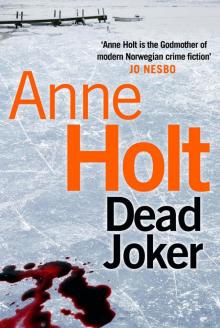 Dead Joker
Dead Joker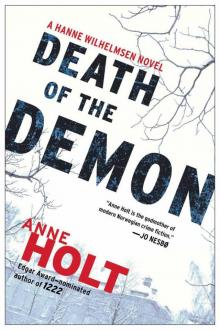 Death of the Demon: A Hanne Wilhelmsen Novel
Death of the Demon: A Hanne Wilhelmsen Novel Punishment aka What Is Mine
Punishment aka What Is Mine Beyond the Truth
Beyond the Truth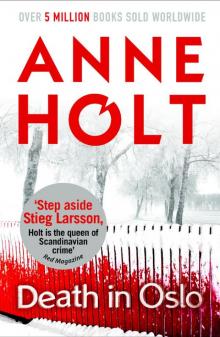 Death in Oslo
Death in Oslo The Blind Goddess
The Blind Goddess What Never Happens
What Never Happens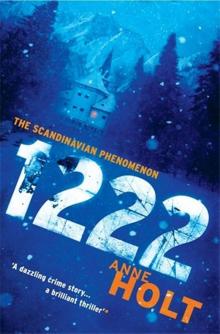 1222
1222 In Dust and Ashes
In Dust and Ashes Odd Numbers
Odd Numbers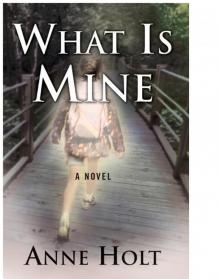 What is Mine
What is Mine What Dark Clouds Hide
What Dark Clouds Hide Blessed Are Those Who Thirst
Blessed Are Those Who Thirst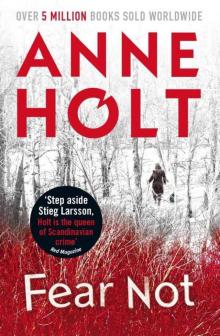 Fear Not
Fear Not No Echo
No Echo Hanne Wilhelmsen - 01 - The Blind Goddess
Hanne Wilhelmsen - 01 - The Blind Goddess